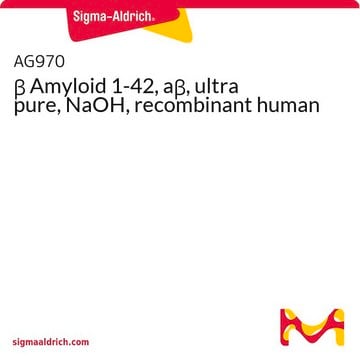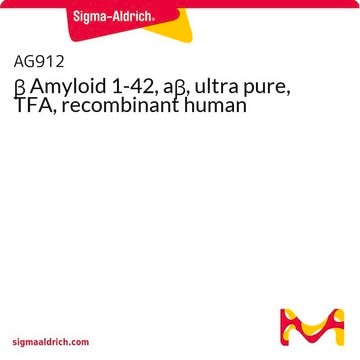All Photos(1)
About This Item
Empirical Formula (Hill Notation):
C203H311N55O60S1
Molecular Weight:
4514.04
UNSPSC Code:
12352200
NACRES:
NA.32
Recommended Products
Assay
≥95% (HPLC)
form
lyophilized
composition
Peptide Content, ≥75%
storage condition
protect from light
storage temp.
−20°C
Amino Acid Sequence
Ala-Ile-Val-Val-Gly-Gly-Val-Met-Leu-Gly-Ile-Ile-Ala-Gly-Lys-Asn-Ser-Gly-Val-Asp-Glu-Ala-Phe-Phe-Val-Leu-Lys-Gln-His-His-Val-Glu-Tyr-Gly-Ser-Asp-His-Arg-Phe-Glu-Ala-Asp
Application
Amyloid β (Aβ) refers to peptides derived from Amyloid precursor protein that vary in length from 36-43 amino acids. Aβ(s) peptides, their peptide fragments and mutated fragments are used to study a wide range of metabolic and regulatory functions including activation of kinases, regulation of cholesterol transport, function as a transcription factor, and regulators of inflammation. Aβ(s) peptides and their peptide fragments are also used to study oxidative stress, metal binding and mechanisms of protein cross-linking in the context of diseases such as Alzheimer′s disease and neurodegeneration.
Storage Class Code
11 - Combustible Solids
WGK
WGK 3
Flash Point(F)
Not applicable
Flash Point(C)
Not applicable
Certificates of Analysis (COA)
Search for Certificates of Analysis (COA) by entering the products Lot/Batch Number. Lot and Batch Numbers can be found on a product’s label following the words ‘Lot’ or ‘Batch’.
Already Own This Product?
Find documentation for the products that you have recently purchased in the Document Library.
Customers Also Viewed
Kodeeswaran Parameshwaran et al.
Synapse (New York, N.Y.), 61(6), 367-374 (2007-03-21)
The brains of Alzheimer's disease (AD) patients have large numbers of plaques that contain amyloid beta (Abeta) peptides which are believed to play a pivotal role in AD pathology. Several lines of evidence have established the inhibitory role of Abeta
S M Yatin et al.
Neurobiology of aging, 20(3), 325-330 (1999-12-10)
The amyloid beta-peptide (A beta)-associated free radical oxidative stress model for neuronal death in Alzheimer's disease (AD) brain predicts that neuronal protein oxidation is a consequence of A beta-associated free radicals [8]. In this study we have used both in
Yujie Zheng et al.
Pharmaceutics, 14(3) (2022-03-27)
Genipin has attracted much attention for its hepatoprotective, anti-inflammatory, and neuroprotection activities. However, poor water solubility and active chemical properties limit its application in food and pharmaceutical industries. This article aimed to develop a lipid-based microemulsion delivery system to improve
U Igbavboa et al.
Neuroscience, 142(3), 655-660 (2006-08-15)
Amyloid beta-protein (Abeta) increases apolipoprotein E (apoE) levels in astrocytes which could alter lipid trafficking. The mechanism for the Abeta-induced increase in apoE levels is not well understood. It is well established that stimulation of beta-adrenergic receptors (betaARs) increases cAMP
Lin Wang et al.
Journal of Alzheimer's disease : JAD, 64(3), 957-971 (2018-07-12)
Alzheimer's disease (AD) is characterized by neuritic plaques and neurofibrillary tangles. It is reported that enzymatic degradation of amyloid-β (Aβ) plays a pivotal role in Aβ accumulation and type-2 cannabinoid receptor (CB2R) participates in Aβ processing in the brain; however
Our team of scientists has experience in all areas of research including Life Science, Material Science, Chemical Synthesis, Chromatography, Analytical and many others.
Contact Technical Service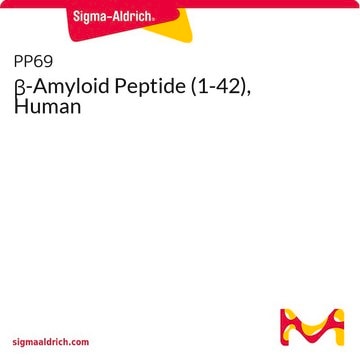


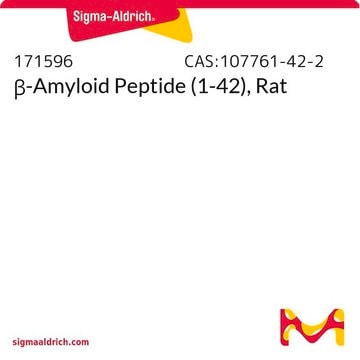
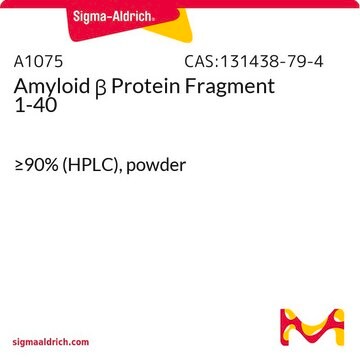
![[Gln22]-Amyloid β 1-40 human ≥95% (HPLC)](/deepweb/assets/sigmaaldrich/product/images/707/874/59f84b84-17c2-494f-b2ae-4ca860b83976/640/59f84b84-17c2-494f-b2ae-4ca860b83976.jpg)


